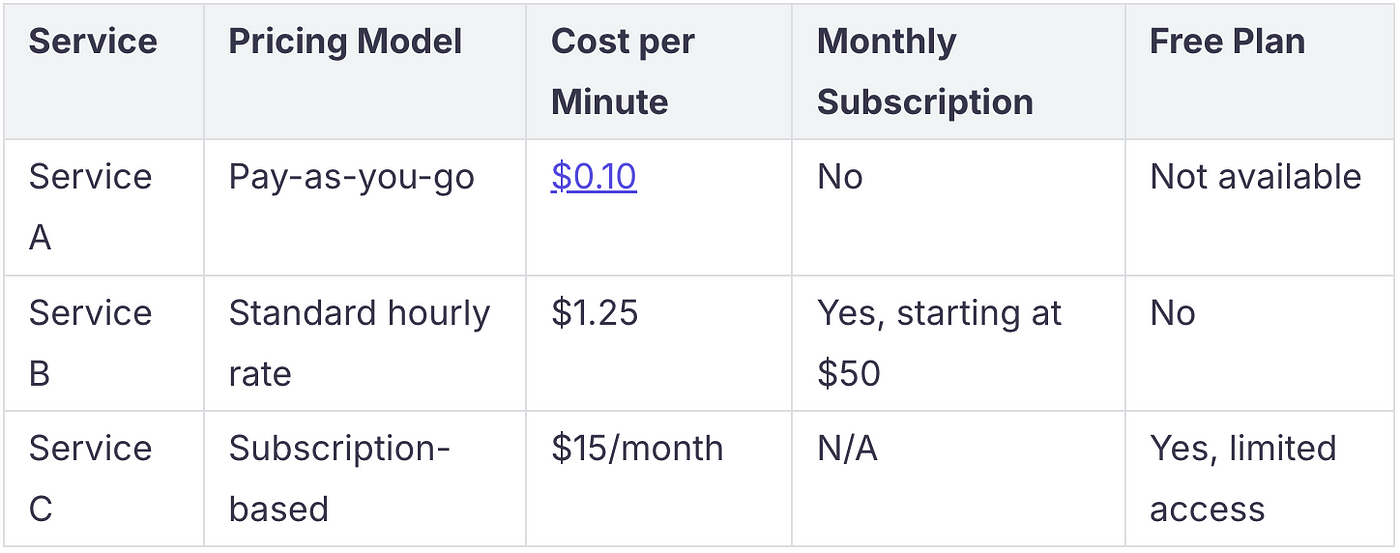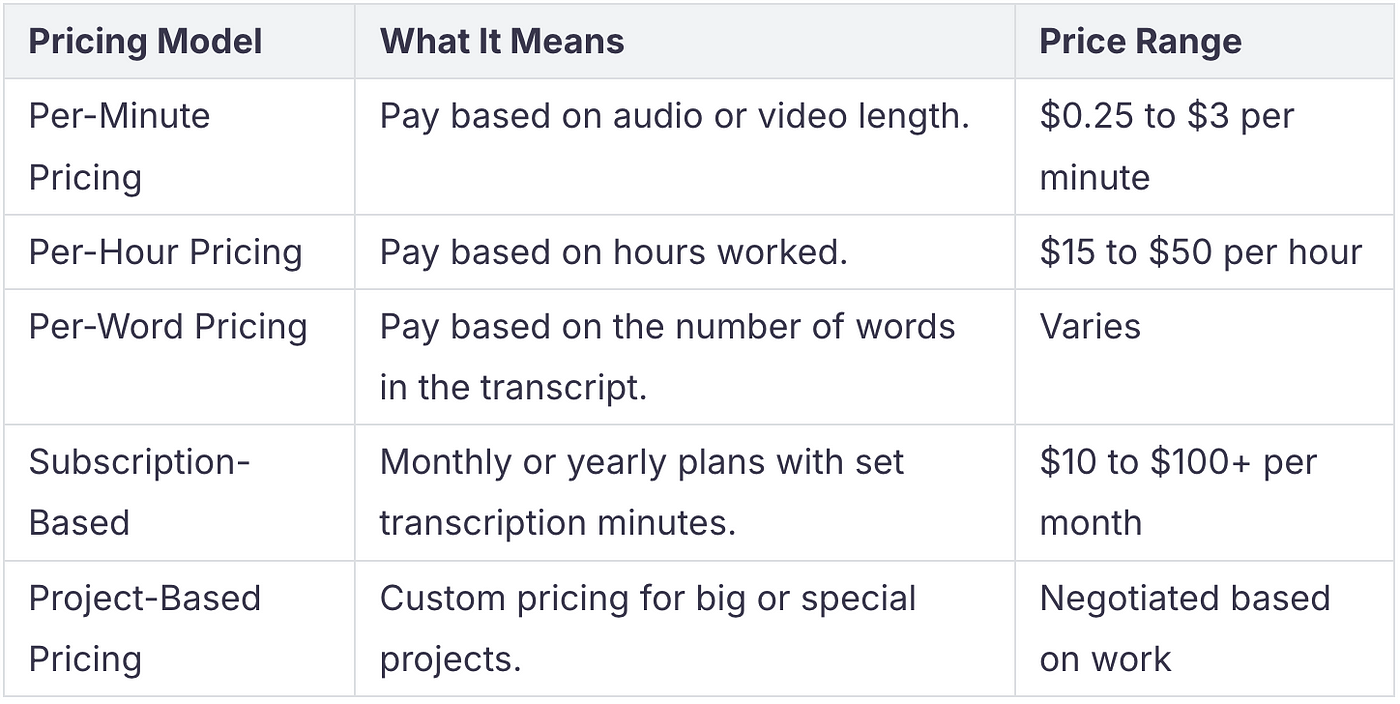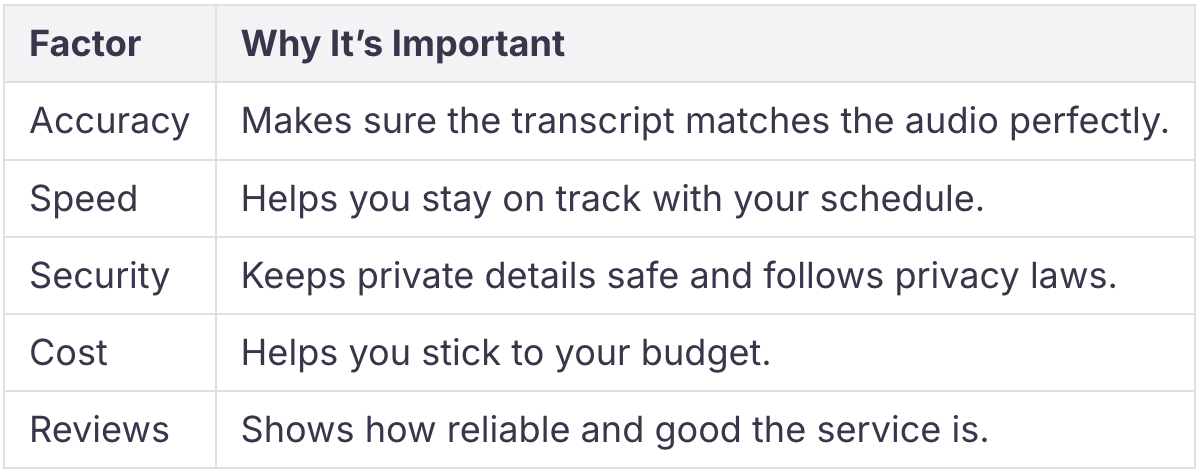How to choose a podcast transcription service

Podcast transcription isn’t just helpful; it’s super important. Turning spoken words into text makes your episodes easy to access. This helps everyone, including 466 million people with hearing loss. Did you know 80% of closed caption users can hear just fine? Transcriptions also help search engines find your content. This makes it easier for new listeners to discover your podcast.
When you choose a podcast transcription service, it’s more than just picking a tool. It’s an investment in growing your podcast. A good service can boost audience interest, bring in more listeners, and make your podcast stand out in the $35.56 billion podcast industry.
Key Takeaways
- Writing down podcast words helps everyone, even people who can’t hear, and makes it easier to find online.
- Pick human, computer, or mixed services based on how correct, fast, or cheap you need it.
- Check for things like time markers and speaker names to make transcripts clearer and easier to use.
- Make sure your data is safe by choosing services that protect it and follow rules like GDPR.
- Try out services with test audio to see how good and simple they are before deciding.
Types of Podcast Transcription Services

When choosing podcast transcription, there are three choices: human, automated, and hybrid. Each has its own benefits. Let’s look at them.
Human transcription services
Human transcription uses people to turn audio into text. It’s very accurate, especially for legal or medical topics. These fields need exact details. Mistakes can cause confusion, so skilled transcribers make sure everything is correct.
Accuracy is checked using word error rate (WER) and character error rate (CER). Human services are great for tricky words and speaker details. But they take more time and cost more than automated tools.
Here’s a table comparing popular transcription services:

Automated transcription services
Automated transcription uses AI to quickly create text from audio. It’s fast and cheap, which is great for saving money. But accuracy depends on sound quality and accents.
If you need speed, automated transcription is the best choice. AI can handle lots of audio in minutes. However, it may have trouble with speaker names or hard words.
Hybrid transcription services
Hybrid transcription mixes AI and human help. AI does the first draft, and humans fix mistakes. This method is fast and accurate. It’s useful for media or legal work.
Why hybrid services are great:
- AI makes transcription fast.
- Humans fix errors for better results.
- Costs less than full human transcription.
By knowing these options, you can choose the best one for your podcast.
Key Things to Think About When Picking a Podcast Transcription Service
Choosing the right transcription service is important. It should meet your needs. Let’s look at three main things: accuracy, speed, and cost.
Accuracy
Accuracy is very important for transcription. Mistakes in transcripts can be annoying. For podcasts with hard topics or many speakers, accuracy matters more. A good service should aim for 98% accuracy.
Here’s a table showing accuracy rates of popular services:

Things like sound quality, noise, and accents affect accuracy. Human services are often the best for this. Hybrid services can also do well. If you want both speed and accuracy, try Createwise. Its AI tools give great results fast. Learn more at Createwise.
Turnaround Time
Time is very important in podcasting. If you’re in a rush, speed matters. Automated services can finish hours of audio in minutes. They are great for quick work. Human services take longer, usually 24–48 hours, but they are more accurate.
Here’s a table comparing turnaround times:

Hybrid services are good for speed and quality. AI does the first draft, and humans fix it. This way, you get accurate transcripts quickly.
Cost
Money is a big factor when choosing a transcription service. Prices can be very different. Some charge per minute, while others have monthly plans.
Here’s a table of pricing models:

Don’t just look at the price. Think about what you get for your money. Features like timestamps and speaker names add value. Createwise is affordable and offers extra tools like AI show notes. It’s a smart pick for podcasters.
Security and privacy
When picking a podcast transcription service, think about security and privacy first. Your podcast might have private details like personal stories or business plans. You wouldn’t want this information to be stolen, right?
Choose services that use encryption to protect your data. Encryption keeps your audio and text files safe while uploading, processing, and storing. Many top services use AES-256 encryption, which is the best for keeping data secure.
Also, check if the service follows rules like GDPR or HIPAA. These rules show the company values your privacy. For example, GDPR ensures your data won’t be shared without your permission.
Here’s a simple checklist for security and privacy:
- Does it use end-to-end encryption?
- Is it GDPR, HIPAA, or privacy-rule compliant?
- Does it provide safe storage for your files?
- Are there clear rules about data sharing and keeping?
By choosing a secure service, you can focus on making great content without worrying about your data’s safety.
Extra features (like timestamps and speaker tags)
Small extras can make a big difference in transcripts. Features like timestamps and speaker tags turn a plain transcript into a useful tool.
Timestamps act like a map for your audio. They help you find specific parts of your podcast quickly. This is great for editors, researchers, or anyone looking for key moments in long episodes.
Speaker tags make transcripts easier to read. They show who is talking, which is super helpful for interviews or group discussions. Imagine reading a transcript where all voices mix — it’s confusing, right? Speaker tags fix that problem.
Why these features matter:
Speaker Tags:
- Show who is speaking.
- Important for interviews, meetings, and legal talks.
- Make transcripts clearer and easier to follow.
Timestamps:
- Help you find parts of long audio fast.
- Show conversation flow and key points.
- Make learning easier with clear time markers.
These extras also help people with hearing issues follow along better. When choosing a podcast transcription service, look for these features. They save time and make your transcripts more useful.
Customer support
Even great tools can have problems, so good customer support is key. You need a service that helps when things go wrong.
First, check how you can contact their support team. Do they offer live chat, email, or phone help? Live chat is quick, while email works for detailed problems. Some services even have 24/7 support, which is great if you work late or in a different time zone.
Also, see if they have a help center or FAQ section. These can guide you to fix common issues yourself. A good help center shows the company cares about your experience.
Things to check:
- Availability: Is support open 24/7?
- Contact Options: Can you reach them by chat, email, or phone?
- Reply Speed: How fast do they respond?
- Resources: Do they have guides or FAQs to help you?
Good customer support isn’t just about fixing issues. It’s about making you feel supported as you grow your podcast. Pick a podcast transcription service that treats you like a partner, not just a customer.
How to Research and Compare Transcription Services
Reading reviews and testimonials
Picking a podcast transcription service? Reviews and testimonials can help. They show what other users think about the service. You’ll learn if it’s accurate, fast, or worth the cost.
Check websites like Trustpilot or G2 for real user reviews. Look for comments on accuracy, speed, and support. For instance, some users love Trint for automatic transcription. Others prefer Rev for its human transcription accuracy.
Testimonials also reveal how services handle accents or bad audio. They show which services are good at reducing errors and misunderstandings. This helps you choose a service that works for you.
Tip: Don’t ignore negative reviews. They often reveal hidden problems you might face.
Testing services with sample audio
Reviews are useful, but testing is even better. Many services let you try sample audio for free or cheap. This helps you see how well they handle your podcast’s content.
Here’s what to check during testing:
- Accuracy: Does the text match the audio? Check tricky words or accents.
- Clarity: Are the sentences easy to follow?
- Speaker Tags: Can it correctly label speakers in group talks?
Some groups tested services with 50 audio clips. They compared results to professional transcripts. Automated tools like Otter worked well, but Rev was best for non-native speakers.
Testing helps you know if a service fits your podcast. It’s a smart way to avoid problems later.
Comparing pricing models and plans
Cost matters when picking a transcription service. You want good value for your money. Services use different pricing methods, so compare them carefully.
Here’s a simple pricing guide:

Per-minute pricing is common and good for short tasks. Subscriptions are better for regular use. For special needs, project-based pricing might be best.
Note: Don’t just focus on price. Think about features too. Services like Createwise offer extras like AI show notes. These tools are great for podcasters. Learn more at Createwise.
By comparing prices, you’ll find a service that fits your budget and needs.
Evaluating ease of use and integration
Picking a podcast transcription service should make your work easier. A simple tool that fits your setup saves time and stress. Let’s see why this is important and what to check.
First, look at how the tool works. Is it easy to understand? A messy design can confuse you, especially if you’re new. You should upload audio, use features, and get transcripts without trouble. The best tools are simple to use right away.
Next, think about using it on different devices. Can you switch between a laptop, tablet, or phone easily? This is helpful if you work in different places. A tool that works well everywhere keeps you productive.
Also, check if it connects with tools you already use. Does it work with Google Drive or Dropbox? If yes, you can move files quickly. This saves time and keeps your work smooth.
Here are some tips for choosing a user-friendly service:
- User feedback: Reviews show if a tool is easy or hard to use.
- Accessibility: Tools that work on many devices are more helpful.
- Workflow compatibility: Easy file sharing saves time and effort.
- Learning curve: Simple tools let you start quickly without confusion.
The right service should fit into your podcasting process easily. It should help you work better, not harder. By focusing on ease of use and integration, you’ll have more time to create amazing podcasts.
Steps to Pick the Best Service
Know what you need
Before choosing a transcription service, think about your needs. Podcasts are unique, so your priorities may differ from others. Ask yourself these questions:
- Do you need very accurate transcripts?
- Is quick delivery important for your schedule?
- Does your podcast have private or sensitive content?
For example, if your podcast discusses private topics, security is key. Pick services with encryption and privacy rules like GDPR. If money is tight, compare prices to find a good deal without losing quality.
Here’s a simple table of things to think about:

Knowing your needs will help you pick the right transcription service.
Research and test services
Once you know your needs, start looking at options. Check reviews on sites like Trustpilot or G2 to see what others say. Look for comments about accuracy, speed, and customer help.
After making a list, test each service with a sample audio file. Many services offer free trials or cheap tests. This lets you see how they handle tricky parts like accents or multiple speakers.
Follow these steps to test:
- Upload a short audio file.
- Check if the transcript is correct, especially for hard words.
- Look for extras like speaker names and timestamps.
- See if the tool is easy to use.
Testing helps you avoid problems later and find the best service for your podcast.
Plan for growth and support
Think about your podcast’s future. As your audience grows, you might need more transcripts. Choose a service that can handle more work without losing quality or speed.
Also, check if the service works with tools you already use, like Google Drive or Dropbox. This makes sharing files easier and saves time.
Good support is important too. Pick a service with helpful customer support. Look for live chat, email, or guides to solve problems quickly.
By planning for growth and choosing strong support, you’ll be ready for long-term success.
Picking the right podcast transcription service can really help your work and audience. To choose the best one, think about these three things:
- Accuracy: Good transcripts have fewer mistakes and are easier to read.
- Turnaround Time: Quick services let you finish projects on time.
- Cost: Budget-friendly options give good results without overspending.

Try out a few services with sample audio before deciding. This helps you see if they meet your podcast’s needs. By checking these points, you’ll make your workflow easier and more successful.
FAQ
What type of transcription service is best for podcasts?
The best choice depends on what you need. For very accurate transcripts, pick human or hybrid services. If you need something fast and cheap, automated services are a good option. Think about your podcast’s topic and budget before choosing.
How much does it cost to transcribe a podcast?
Costs are different for each service. Automated transcription can be as low as $0.10 per minute. Human transcription can cost up to $3 per minute. Some services have monthly plans starting at $15. Compare prices and features to get the best deal.
Can transcription services handle more than one speaker?
Yes, many can. Look for tools like speaker labels or diarization. These features show who is talking, making transcripts easier to read. Hybrid and human services are usually better at this than automated ones.
Are free transcription services good to use?
Free services can work for simple tasks, but they often miss details. They may not have features like timestamps or speaker tags. If you want high quality, it’s better to pay for a service.
How can I try a transcription service before paying?
Most services let you test them for free or at a low cost. Upload a short audio file to check how accurate it is. See if it adds speaker names and is easy to use. Testing helps you find the right service for your podcast.